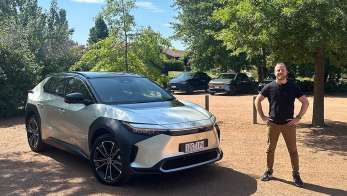The widely condemned campaign by a car magazine to raise the speed limit on the Hume Highway to 130km/h has won favour among the motoring public -- and race driver Mark Skaife who backed the increase said it should only happen if annual safety inspections were reintroduced for older cars.
Police and politicians slammed the stunt by Wheels magazine as a “ridiculous” threat to the safety of other road users after it commissioned a foreign journalist to drive from Melbourne to Sydney at 130km/h one Saturday in July.
To the magazine’s surprise and the embarrassment of the Victorian and NSW Police, the lead-footed journalist didn’t get caught and authorities predictably denounced the publicity stunt.
But a TV viewer poll received almost 400,000 votes in less than 30 minutes, with the overwhelming majority in favour of increasing the speed limit to 130km/h or 140km/h, as it is in Europe.
Exclusive figures obtained by News Corp found motorists in Victoria --which has the strictest enforcement nationally with a 2kmh tolerance to speed limits -- were most in favour of raising the limit.
According to Channel 7’s online poll 60 per cent of Victorian voters wanted the speed limit increased to 140km/h, compared to 57 per cent of viewers from NSW and Queensland.
More than twice as many respondents in the three eastern states wanted the speed limit raised to 130km/h (20 to 27 per cent) compared to those who wanted it capped at the current 110km/h limit (8 to 11 per cent). Figures for other states and territories were not statistically valid as the broadcast of the Today Tonight program was delayed in those regions.
Race driver and road safety advocate Mark Skaife said the magazine’s stunt was “naughty” but backed the campaign to raise the limit to 130km/h -- with some conditions. “I would be in favour of increasing the speed limit to 130km/h on some sections of the Hume Highway, but not at night and not in the rain, just like they do in Europe,” said Skaife.
“It should only happen if annual safety checks were re-introduced on older cars. The fact that the frequency of safety checks have been relaxed in some states and are non-existent in other states until you sell a car is just madness.”
In the past 10 years NSW has relaxed its annual safety checks from three years after the car was bought new, to five years and now to seven years. Most other states have no annual safety checks until the car is sold.
“I have a genuine fear that the focus on speed is blinding us to other causes of crashes,” said Skaife. Federal safety authority figures show almost a quarter of cars involved in fatal crashes are unregistered or driven by banned or unlicenced drivers. A similar proportion of drivers are drunk, drug affected or not wearing seatbelts.
Skaife said drivers who were afraid of travelling at 130km/h had “nothing to worry about”. “This is a speed limit, it’s not compulsory,” said the six-times Bathurst 1000 winner. “If you’re not comfortable travelling at that speed, move into the left lane.”
This reporter is on Twitter: @JoshuaDowling


.jpg)


.jpg)








.jpg)


.jpg)


Comments